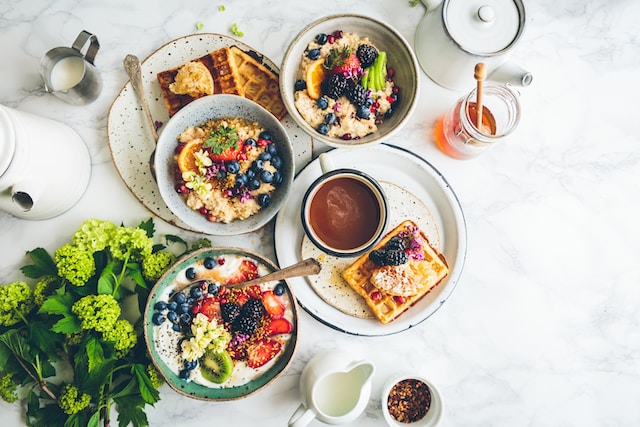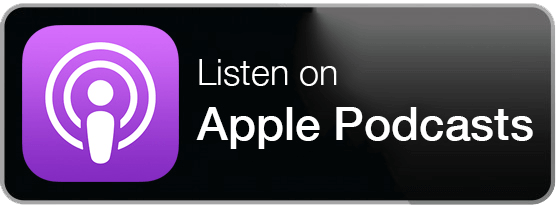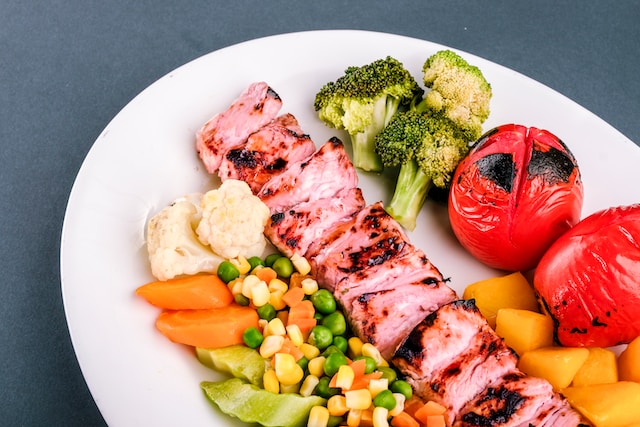Cover photo by Sam Moghadam Khamseh on Unsplash
Today’s Focus of Attention is reader-supported. We sometimes include products we think are useful for our readers. If you buy through links on this page, we may earn a small commission.
What if I told you that the secret to a longer, happier life is as simple as what you put on your plate?
Eating well is not only good for your body, but also for your mind and your overall well-being.
A balanced diet provides you with many benefits, such as energy, growth, repair, prevention, and enjoyment.
As the old saying goes, “You are what you eat.”
In today’s article, we’ll delve into the importance of well-rounded nutrition and offer tips on how to achieve it.
What Is A Balanced Diet?
A balanced diet is one that gives your body all the nutrients it needs to work properly. This includes macronutrients (protein, carbohydrates, and fat) and micronutrients (vitamins and minerals).
In accordance with the NHS, a balanced diet consists of:
- Plenty of fruits and vegetables (at least five portions a day)
- Starchy foods: bread, rice, potatoes, and pasta (wholegrain)
- Proteins: meat, fish, eggs, beans, and pulses
- Dairy: milk, cheese, and yoghurt (low-fat)
- Healthy fats: olive oil, nuts, seeds, and avocados
- Fluids: water, tea, coffee, and sugar-free drinks
A balanced diet also limits or avoids:
- Added sugars: sweets, cakes, biscuits, and soft drinks
- Saturated fats: butter, cream, and fatty meats
- Salt: salted snacks, sauces, and processed foods
- Alcohol (no more than 14 units a week for both men and women)

Surprising Facts
Nutrient Timing
Eating protein-rich foods within two hours after exercise improves muscle recovery.
Brain Function
Omega-3 fatty acids, found in fish and flaxseed, can enhance cognitive performance and may even reduce the likelihood of Alzheimer’s.
Longevity
Studies have shown that people who eat a balanced diet teeming with fruits, vegetables, and whole grains have a lower risk of dying from heart disease and certain types of cancer.
Mood Boosters
Foods rich in tryptophan, like turkey and cheese, boost your mental and emotional well-being.
Sugar Shock
The average person consumes about 17 teaspoons of added sugar per day, which is triple the recommended amount, leading to various health issues.
Colour Matters
The colour of your food shows its nutrient content. For example, red and purple foods often contain antioxidants, which help fight inflammation.
Spice It Up
Spices like turmeric and cinnamon not only add flavour but also have anti-inflammatory properties and regulate blood sugar.
Hydration
Even mild dehydration can affect your mood, energy level, and ability to think clearly.
Fibre Facts
Most people only consume half of the recommended daily intake of fibre, which is crucial for digestive health and helps prevent certain types of cancer.
Caloric Consumption
Contrary to popular belief, not all calories are equal. 100 calories of broccoli will have a different impact than 100 calories of soda.
What Are the Benefits of a Balanced Diet?
Energy
- A balanced diet provides the stamina you need to stay active. Carbohydrates, for instance, are converted into sugar that your cells use for various functions.
- Fruits and vegetables provide vitamins and minerals that help convert food into energy.
Growth and Repair
- Proteins are essential for building and maintaining your muscles, bones, skin, hair, nails, and organs. They also assist in the production of hormones, enzymes, and antibodies.
- Calcium and vitamin D keep your bones strong and healthy.
- Iron makes red blood cells, which carry oxygen around your body.
Prevention
With a balanced diet, you prevent or reduce the risk of various diseases and health problems.
- Fibre helps lower your cholesterol levels and alleviate constipation.
- Antioxidants protect your cells from damage caused by free radicals.
- Omega-3 fatty acids decrease your blood pressure and ward off inflammation.
- Folate is crucial for preventing birth defects in pregnant women.
- Vitamin C boosts your immune system and fights infections.
Enjoyment
A variety of foods makes your meals more interesting and tasty.
But have you ever considered the role of mindfulness in enhancing your dining experience?
Practicing mindful eating transforms your mealtimes into relaxing and rewarding experiences.
Here’s how:
Pause Before You Eat
Prior to eating, spend a moment to appreciate the food in front of you.
Chew Slowly
Take the time to enjoy each bite. This not only aids in digestion but also allows you to savour each flavour.
Put Down Your Utensils
Between bites, drop your fork or spoon. This encourages you to slow down rather than rush.
Tune Into Your Sense
Pay attention to the colours, textures, and aromas. This sensory experience enhances your enjoyment and makes the meal more satisfying.
Listen to Your Body
Be aware of your body’s hunger and fullness cues. Stop eating when you’re comfortably full, even if you still have food on your plate.
Limit Distractions
Turn off the TV, put away your phone, and try to eat in a calm environment. Disturbances might lead to overeating.
Practice Gratitude
Before or after your meal, take a moment to be grateful. This adds a layer of emotional well-being to your experience.

A virtual and portable drumming solution…

How Can You Achieve a Balanced Diet?
It may seem challenging at first, but not impossible. Here are a few tips on how to reach a balanced diet:
Shop Smart
Shopping smartly saves you money and time. Look for discounts, coupons, or buy in bulk when possible.
Prepare Meals In-House
Cooking at home lets you control what’s in your food and how much you eat. Experiment with different spices or herbs to add flavour without adding salt or sugar.
Eat Out Wisely
Eating out once in a while can be enjoyable and convenient, but also unhealthy and expensive.
Plan Ahead
Planning meals in advance helps you eat better and resist junk food. Use apps to create your nutritional strategy. Some are free, while others require a subscription fee.
Here are a few examples:
Mealime
It allows you to generate a shopping list and design custom meal plans according to your dietary restrictions, preferences, and budget.
Yummly
A no-cost software that offers a wide variety of cooking instructions, including those that are tailored to specific nutritional requirements. You can also make daily food guides and grocery lists.
Paprika
This premium application lets you import recipes from the web and organise them.
MealPrepPro
Similar to the free ones, MPP allows you to create custom meal plans and generate buying checklists based on your diet.
What to Eat for A Balanced Diet?
Here are a few examples of optimal meals and snacks:
Breakfast
- Oatmeal with berries and nuts
- Yoghurt with fruit and granola
- Eggs with whole-wheat toast and avocado
Lunch
- Salad with grilled chicken or fish
- Whole-wheat wrap with hummus and vegetables
- Lentil soup with whole-wheat bread
Dinner
- Salmon with roasted vegetables
- A quinoa bowl with black beans and corn
- Chicken stir-fry with brown rice
Snacks
- Fruits and vegetables, nuts, seeds, yoghurt, hard-boiled eggs.
If you have any special dietary needs or concerns, be sure to talk to your doctor or a dietitian. They can help you create a balanced diet that is right for you.
Final Thoughts
Eating well is not just about physical health, but a cornerstone of your overall well-being.
A balanced diet offers a plethora of benefits, from boosting your energy to reducing the risk of chronic diseases.
And the best part? It’s achievable with a bit of planning and mindfulness.
Since individual needs may vary, consulting a healthcare specialist gives personalised guidance without draining your finances.
Remember, a balanced diet is not a one-size-fits-all solution, but a flexible framework that you can adapt to your lifestyle.
In today’s economy, it’s also worth noting that eating well doesn’t have to break the bank. With smart shopping and meal planning, you nourish your body and soul without emptying your wallet.
We hope this information has inspired you to embark on a journey towards a more balanced and fulfilling diet.
Feel free to share your experiences and tips in the comments below.
Happy eating!


